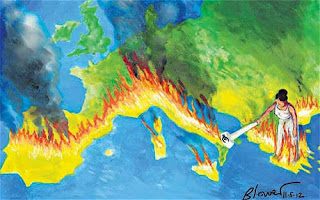Just because there is the gloomy, heavy drapery of bankers’ crises and the pummeling occasion of planters’ style democracy obscuring the next assault that’s waiting in the wings, we would be faithfully remiss to lose sight of what could come. Bread—or cake—is of course the honey-pot, the next investment opportunity aggressively peddled, of bread and circuses, and I believe it is not so kooky or implausible to imagine that the present chaos is apt disguise for a handful of companies that are merging farms and pharmaceuticals to make local governments fold and adopt measures that have become prevalent elsewhere.
Tuesday 15 May 2012
farmageddon, pharmageddon
catagories: food and drink, health and medicine
golden parachute
Of course, these imbalances are compounded in business and government as well, in the forms of lost capital, revenue and social-services. If any other utility—and again that’s all that any bank is, like the electric company or Reading Railroad—business enterprise or government failed as consistently and unapologetically to deliver, they would be rightfully remediated or dismissed.
 The same financial institutions that are bringing the euro to the brink, like giant babies in some blameless but willfully destructive playpen, are admitting to nothing, nor being held with any responsibility by their host governments that created the framework for them to raise amazing wealth. I don’t think there is any extraordinary conspiracy behind the governments of the European Union trying to cobble together a fragile fiscal pact four years after certain inevitabilities became apparent (other than the anodyne corruption of politics and wealth).
The same financial institutions that are bringing the euro to the brink, like giant babies in some blameless but willfully destructive playpen, are admitting to nothing, nor being held with any responsibility by their host governments that created the framework for them to raise amazing wealth. I don’t think there is any extraordinary conspiracy behind the governments of the European Union trying to cobble together a fragile fiscal pact four years after certain inevitabilities became apparent (other than the anodyne corruption of politics and wealth).
Delay and unchecked speculation, however, has only afforded the chance for bankers—not the cleverest or most creative lot—to huddle in their war-rooms and quietly, only eking out panic in controlled doses—prepare to re-tabulate the score, drafting the new financial order while economic ministers obliged with a believable cover, again deflecting blame and becoming the saving champions of the markets.
catagories: economic policy, Europe, labour
Sunday 13 May 2012
dramaturgy
There has been an awful back-draft lashing European politics and markets, sparked by the exercise of public prerogatives that seemingly did not follow the right plan.
Nothing was ventured, as a result, about the structural differences, maintaining a plurality in both super-states but one noticeably without mechanisms for intervention. The US Federal government is not telling the States, like Texas, that do not levy an individual income tax on its residents to do so or accuse some localities of providing too many incentives. Maybe, however, it will come to that and we still maybe unwilling to learn from one another, since economic problems can always be masked behind a glossier façade of potential for profit and assigning blame is easier than accepting change. A crisis is always driven by under-estimates (willful or unintentional) that cannot hope to keep enthusiasm in check.
bottle of wine, fruit of the vine
If one looks at this label a-scant (especially after a glass or two from the bottle), it seems to read vinetards, instead of the word for a plantation for the cultivation of grapes (Weinberg). That really sounds like an insult, and I think that one would no longer fancy himself a connoisseur of fine wine after being called that, nor does it seem a particularly favourable endorsement for having bought said bottle of wine, which was actually quite good.
catagories: food and drink
Thursday 10 May 2012
idle hands and the devil's workshop
While clearing out some neglected filing cabinets at work, I came across a packet of educational materials, first noticing the awesome hand drawn mimeotype symbols, but then I read the short essay and realized that hysteria, fear-mongering and urban legends about Satanic Cults in the 1980s is no different from the phenomena of terrorism and security—except that fretful parents did not need the constant drone of government to reinforce fears and were able to sustain worry over whether their children were in a cult or were going to be abducted or sacrificed. It was also a scary and weird time, and enough horrible things go on without being fixated on nebulous threats that never surfaced—just like now.
Cults (the essay's title), which takes a very scientific and exhaustive approach to the topic begins: “This is a sensitive subject. One of the ideals this country is founded on is freedom of religion. Satanism is a recognized religion.” What other recognized religions could be substituted nowadays? This anonymous study is worth reading in the grainy typewritten original with the tone of an after-school special, and the lists of suspicious activities and warning signs become a modern allegory for the recommended reactions and misgivings of terrorists-hunters and holy-rollers.













